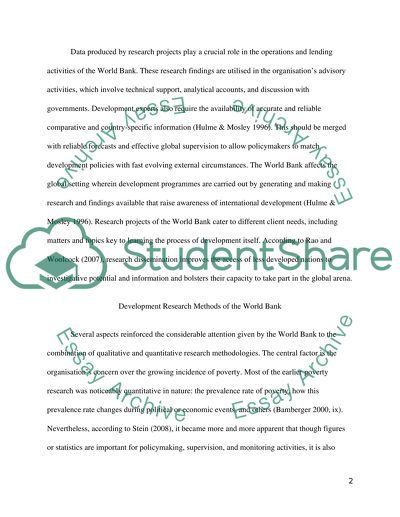Cite this document
(“In the study of poverty, the World Bank, UN agencies, and other large Essay”, n.d.)
In the study of poverty, the World Bank, UN agencies, and other large Essay. Retrieved from https://studentshare.org/miscellaneous/1594106-in-the-study-of-poverty-the-world-bank-un-agencies-and-other-large-organisations-play-an-important-role-critically-examine-the-development-research-methods-used-by-the-development-research-arms-of-one-largescale-development-organisation
In the study of poverty, the World Bank, UN agencies, and other large Essay. Retrieved from https://studentshare.org/miscellaneous/1594106-in-the-study-of-poverty-the-world-bank-un-agencies-and-other-large-organisations-play-an-important-role-critically-examine-the-development-research-methods-used-by-the-development-research-arms-of-one-largescale-development-organisation
(In the Study of Poverty, the World Bank, UN Agencies, and Other Large Essay)
In the Study of Poverty, the World Bank, UN Agencies, and Other Large Essay. https://studentshare.org/miscellaneous/1594106-in-the-study-of-poverty-the-world-bank-un-agencies-and-other-large-organisations-play-an-important-role-critically-examine-the-development-research-methods-used-by-the-development-research-arms-of-one-largescale-development-organisation.
In the Study of Poverty, the World Bank, UN Agencies, and Other Large Essay. https://studentshare.org/miscellaneous/1594106-in-the-study-of-poverty-the-world-bank-un-agencies-and-other-large-organisations-play-an-important-role-critically-examine-the-development-research-methods-used-by-the-development-research-arms-of-one-largescale-development-organisation.
“In the Study of Poverty, the World Bank, UN Agencies, and Other Large Essay”, n.d. https://studentshare.org/miscellaneous/1594106-in-the-study-of-poverty-the-world-bank-un-agencies-and-other-large-organisations-play-an-important-role-critically-examine-the-development-research-methods-used-by-the-development-research-arms-of-one-largescale-development-organisation.


